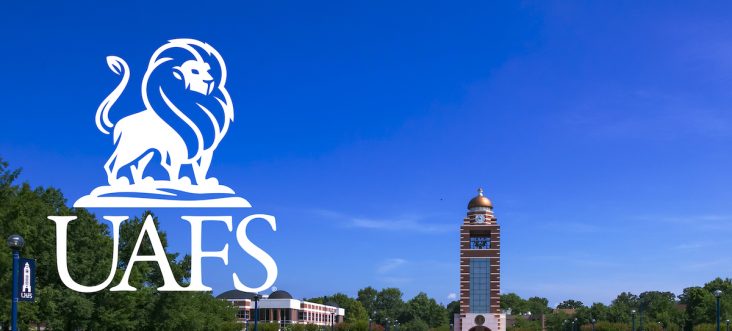UAFS enrollment declines, student success and retention position filled
by September 14, 2021 5:08 pm 1,768 views

According to an unofficial University of Arkansas at Fort Smith enrollment report on Sept. 8, there was a headcount of 2,444 continuing students, down 13.9% from the 2,838 continuing students counted on the same date in 2020.
Though the number of first-time entering students is also down, 8.1% from 885 on the date in 2020 to 813 in 2021, an almost 24% increase in transfer students and slight increase in readmitted students, keeps the incoming class only two students below last year’s. If numbers are compared to 2020’s official enrollment numbers, this year’s incoming class is up two from last year.
In 2020, the official headcount on the census date of the incoming class included 261 entering transfer students, 883 first-time entering students and 327 re-admitted students for a total of 1,471 students. Readmitted students are students who attended UAFS once but not for years, according to Rachel Rodemann Putman, associate director for strategic communications.
This year’s unofficial enrollment report on Sept. 8 includes 325 entering transfer students, a 23.6% increase, 813 first-time entering students and 335 readmitted students, a 2.4% increase, for a total of 1,473 students in the incoming class.
“Our overall increase for the incoming class of students, primarily due to a 24% increase in transfer students, provides great hope for the future at UAFS. Amidst the uncertainty of the COVID pandemic we worked hard as an institution to adapt and change the ways in which we teach, the ways we interact with students and the ways in which we recruit students,” said Andy Johnson, director of admissions. “I’m excited to see how our admissions department is leaning into new ways to connect with high school and transfer students through technology as well as a renewed emphasis in our desire to build relationships with students and families in order to help them make the best decision on which school to attend.”
Retaining students has been a little more difficult this year for the university. On the census date in 2020 the head count included 2,840 continuing students and 221 continuing freshmen for a total of 3,061 students. This year’s unofficial enrollment report lists 2,444 continuing students and 214 continuing freshmen for a total of 2,658, a 13.3% decrease.
The total undergraduate enrollment this semester is 4,230 (which includes unclassified post- and pre-baccalaureate students) as taken on Sept. 8, a 9.1% decrease from the 4,653 total undergraduate enrollment on the census date in 2020, according to the unofficial enrollment report. The total graduate enrollment was 46, a 19.3% decrease from the 58 in fall 2020.
“At UAFS, as at other colleges and universities across the nation, there is a growing need to be more deliberate and innovative in efforts to retain currently-enrolled students and ensure their success. Following a year-long assessment of the university, we have committed to strategic realignments within Academic Affairs, including the alignment of all of our student success operations under a single umbrella in the Office of Student Success and Retention,” said Dr. Georgia Hale, UAFS provost.
The university recently announced that Dr. Blake Johnson will take on the role as assistant provost of student success and retention beginning Oct. 18.
“While we know some of our losses are surely due to the uncertainty, stress, and exhaustion brought about by the COVID-19 pandemic, there are yet many opportunities to provide better, more streamlined services to our students ensuring their continued success and graduation from UAFS,” Hale said.
Johnson has worked in higher education since 2002. He works as a faculty fellow with the Elbogen Center for Teaching and learning, a senior lecturer with LeaRN and manager of transfer relations and student success in a statewide transfer success initiative at the University of Wyoming. Across these roles, he has worked as an administrator in a coordinated effort to improve onboarding, retention and student success for transfer and nontraditional students, a news release said.
Johnson also chairs the university’s Transfer Success Group, is a member of the Faculty Learning Community for First-Generation Initiatives and has launched numerous programs and partnerships to improve student outcomes.
In the assistant provost role, Johnson will provide leadership and oversight in the development, coordination and monitoring of retention and student success initiatives. In collaboration with deans, academic departments, campus administrators, faculty, and staff, he will be charged with setting a strategic direction for student success initiatives aimed at increasing year-to-year retention and graduation rates.
“The national landscape for retention initiatives has grown significantly in recent years, as it should, but many well-intended, front-facing initiatives fall short,” Johnson said. “To genuinely be equity-minded, we have to approach retention with an outcomes first perspective and assess our effectiveness in light of specific barriers our students experience. When I am speaking or writing, the most common barriers I address are cost, academic preparedness, sense of belonging, and career applicability. I believe all of these have direct relevance for the future of student success at UAFS.”
Prior to his time at Wyoming, Johnson served as a retention administrator with the Pathway to the Baccalaureate Program, a nationally-recognized initiative to support access and completion for historically underrepresented students, leading a centralized retention office and served on a committee overseeing career services for 77,000 students. He also directed more than $1.5 million in grant funding and led service components involving admissions, academic success, financial aid, parent/family initiatives, and student wellness. Earlier in his career, he held positions focused on student engagement, technology utilization, and assessment at George Mason University, OnCourse Learning, and the University of Maryland.
Johnson has a master’s degree in educational psychology and a doctorate in education and human development from George Mason University.
